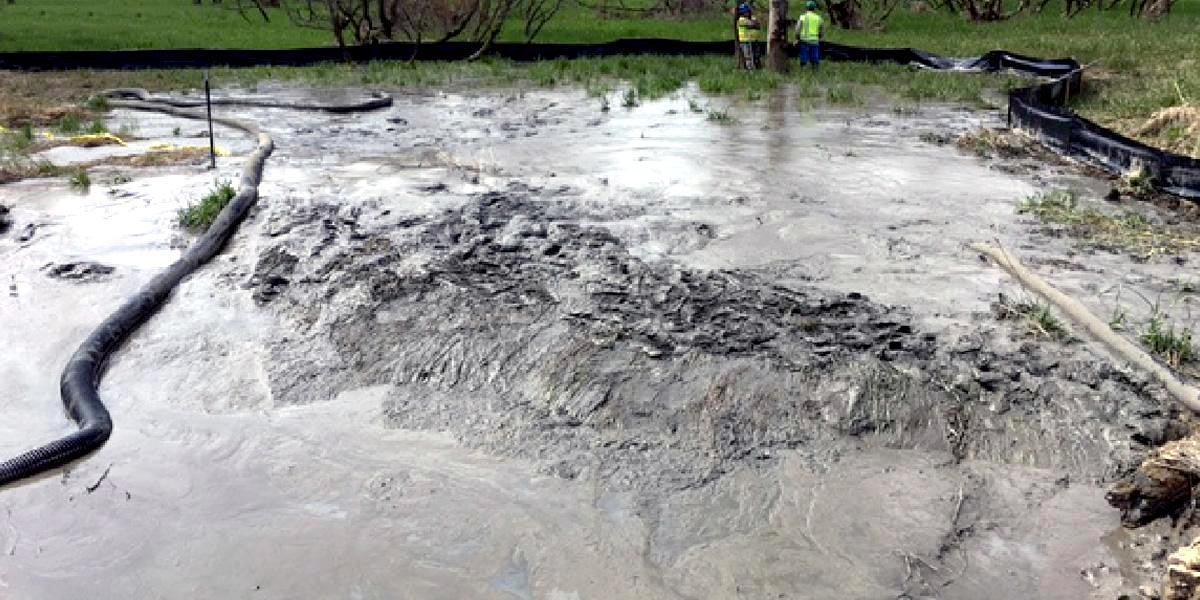

Construction of Energy Transfer Partners‘ new Rover Pipeline only began mid-February but the project has already resulted in 18 incidents involving mud spills from drilling, stormwater pollution and open burning that violated the Clean Air Act.
The Dallas-based company—which is also the operator of the controversial Dakota Access Pipeline—has been fined $431,000 by the Ohio Environmental Protection Agency (EPA) for water and air pollution violations across various sites in Ohio.
As The Columbus Dispatch reported, the incidents occurred from late March up to Monday’s 200-gallon release of mud in Harrison County. The largest discharge leaked millions of gallons of bentonite mud, a drilling lubricant, into a protected wetland in April.
A widely-opposed pipeline 'confirms worst fears' after two spills into Ohio wetlands: https://t.co/0CaYLLQHKG via @EcoWatch
— NRDC 🌎🏡 (@NRDC) April 21, 2017
Notably, Craig Butler, the Ohio EPA director, told The Washington Post that the largest spill could reach 5 million gallons, much higher than the original 2 million gallon estimate.
An Energy Transfer Partners spokesman responded, “We have no idea where they came up with those figures.”
Butler told The Post that two of the spills affected drinking water supplies and that two municipalities needed to adjust their filtration systems to protect drinking water.
As far as Energy Transfer’s response, Butler said the company has been “dismissive,” “exceptionally disappointing” and unlike any other response he has seen. According to Butler, the company claimed that the state EPA lacks the authority to interfere with the Rover project.
Butler said he arranged a meeting with Energy Transfer Partners executives to say “how upset Ohio was” and to arrange new response plans. However, the company said it would continue to operate and has not yet paid any of its fines.
An Energy Transfer spokeswoman told The Columbus Dispatch that the “small number of inadvertent releases of ‘drilling mud’ during horizontal drilling in Ohio … is not an unusual occurrence when executing directional drilling operations and is all permitted activity by (the Federal Energy Regulatory Commission).”
“We do not believe that there will be any impact to the environment,” she said, adding that the company is managing the Rover Pipeline situation in accordance with its federal- and state-approved contingency plan.
Ohio EPA officials contacted the Federal Energy Regulatory Commission for an analysis of the project. Butler said the state EPA is also examining other legal options.
The finished 713-mile pipeline will carry fracked gas across Pennsylvania, West Virginia, Ohio, Michigan and Canada, and crosses three major rivers, the Maumee, Sandusky and Portage, all of which feed into Lake Erie. The pipeline is designed to transport 3.25 billion cubic feet of domestically produced natural gas per day.
The Sierra Club condemned Energy Transfer for failing to inform the public of its numerous spills and violations. Rather, the news was discovered after the Sierra Club attorney Richard Sahli filed a records request with the Ohio Environmental Protection Agency.
According to the documents, the company anticipates even more spills throughout the duration of the project, which is estimated to last six months.
“Energy Transfer has caused more widespread environmental damage throughout Ohio than any other company in history,” Sahli said.”This pattern of reckless destruction calls for the strongest penalties provided in Ohio law, including a criminal investigation of the responsible individuals within the corporation and its subcontractors.”
Jen Miller, director of Sierra Club Ohio, is calling on the Ohio EPA to halt the pipeline’s construction.
“Energy Transfer is either incompetent, or simply doesn’t care about Ohioans’ safety,” Miller said. “The recklessness constructing Rover Pipeline has put our clean water, air, and land in immediate danger with its spills and violations, and it must be stopped. Ohio EPA needs to keep our communities safe by forcing a halt to the pipeline’s construction until the company completely reorganizes its construction program and fully remedies the harm it has already caused to communities and landowners thus far.”
“If Energy Transfer is already destroying our air, water and land, how can we trust them to build a pipeline that actually functions properly?” Miller asked. “Energy Transfer has proven to not be trustworthy.”
The Sierra Club has tallied a number of Rover’s environmental violations across Ohio:
April 5, 2017: unauthorized pollution release impacting tributaries of Woodfield Reservoir in Monroe County, failure to control stormwater
April 8, 2017: 1,000 gallons of drilling fluid pollution released into wetland near Indian Fork River, in Tuscarawas County; covered 2500 square foot area of wetland
April 10, 2017: 600 gallons of drilling fluid pollution released into stream, wetland and pond in Richland Township, Belmont County
April 10, 2017: unauthorized pollution release impacting tributaries of Woodfield Reservoir in Monroe County, failure to control stormwater
April 11, 2017: unauthorized pollution release from failure to manage stormwater in Bloomdale, Wood County
April 11, 2017: Clean Air Act violation, open burning of site preparation material near a home in Toronto, Ohio
April 11, 2017: Stormwater violations in Wood, Richland, and Crawford Counties because of failure to manage vehicle tracking of drilling materials onto public roadways
April 12, 2017: unauthorized pollution release into Bull Creek in Wood County, failure to control stormwater
April 13,2017: 2 million gallons of drilling fluid pollution accumulating in high quality wetland adjacent to Tuscarawas River in Navarre Township, Stark County; covered 500,000 sq foot area of the category 3 wetland
April 14, 2017: 50,000 gallons of drilling fluid pollution released into wetland in Mifflin Township, Richland County
April 17, 2017: 200 gallons of drilling fluid pollution released into a pond in Monroe Township, Harrison County
April 22, 2017: 200 gallons of drilling fluid pollution released into stream in Wooster Township, Wayne County
May 2, 2017: unauthorized pollution release from failure to manage stormwater in Bloomdale, Wood County
May 3, 2017: unauthorized pollution release into Brushy Fork Creek, Cadiz, Harrison County, failure to control stormwater

 233k
233k  41k
41k  Subscribe
Subscribe 